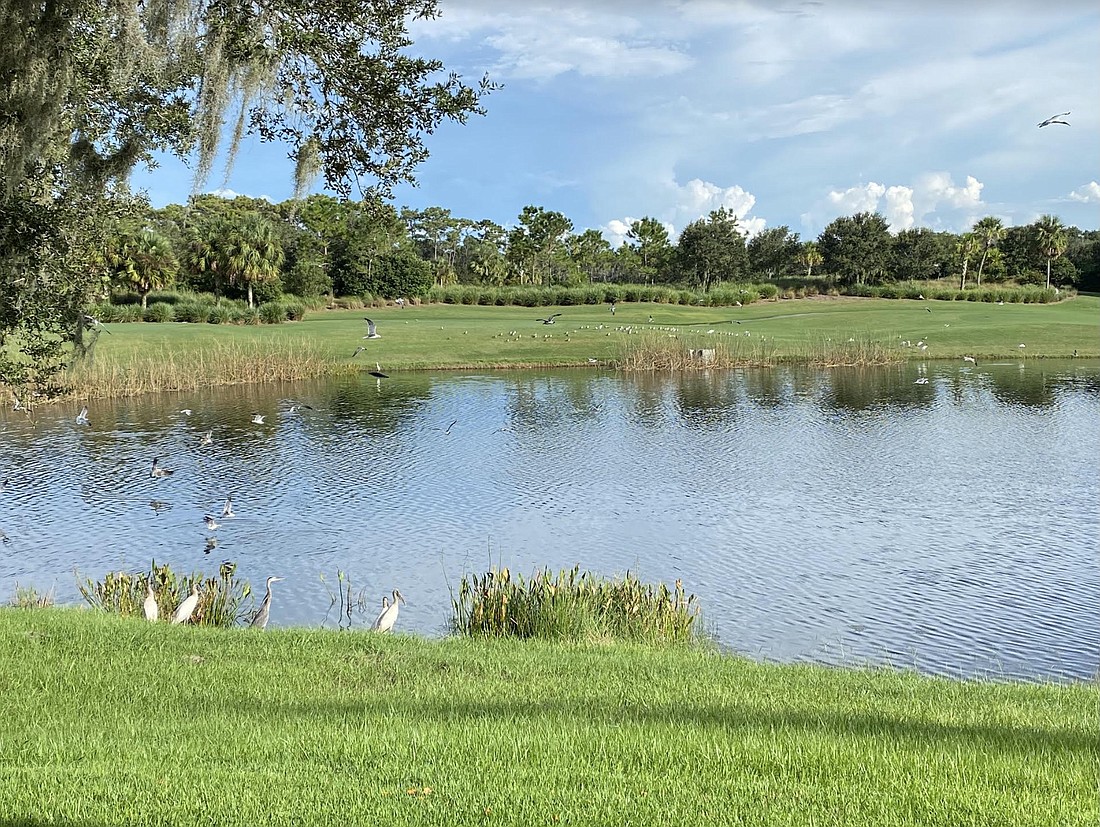- April 19, 2024
-
-
Loading

Loading

It’s not a scene residents expect when they walk in paradise.
Ponds all over the region have experienced what scientists suspect are lower oxygen levels, leading to dead fish.
The Lakewood Ranch area is not immune to the problem.
Summerfield’s Mark Engel said he has seen dead fish along the shores of lakes in his community. He has lived in the home for several years, and although there always were “pretty heavy-duty” rains around this time of year that affect water oxygen levels, he had never seen an incident like this in the past.
A.J. Reisinger, an assistant professor of Urban Soil and Water Quality at the University of Florida, said Lakewood Ranch residents have been contacting his office about the issue.
He said pond sensors placed in Lakewood Ranch were showing evidence of fish kills in the area, and in the coming weeks, his staff would have more data on oxygen levels in the water, which will help them understand what is taking place.
He said the unclear boundary between natural and unnatural occurrences makes determining causes difficult.
“It’s a completely artificial ecosystem, but that doesn’t mean the processes occurring within it are not natural processes,” he said. “It’s hard to say whether it’s natural or not because everything is kind of influenced by human activities.”
He said what often causes fish kills is a lack of oxygen in the water, which itself can have a few different causes.
Weather impacts the ponds, and warmer water naturally holds less oxygen than cold water does.
However, that effect is increased if warmer temperatures are accompanied by growth of algae, as the decomposition process of algae absorbs the oxygen in the water.
Read more: Manatee County borrows money to move up infrastructure projects
Therefore, Reisinger said, a common pattern preceding fish-kill events is sunny days followed by storm events. The sunlight encourages algal growth, while storms bring in sediments that kill these algae, causing higher-than-normal levels of oxygen depletion.
Rainwater also can release nitrogen into the water that encourages further algal growth.
He said another factor in fish kills is the difference in temperatures between water on top and on the bottom of the lake in times of hot temperatures.
Water at the bottom, deprived of sunlight and with no algae or plants photosynthesizing in it, is devoid of oxygen. The lake remains stratified because of the lower density of the warm water, keeping it on top of the denser cold water.
When stratification occurs, the mixing effect of storm winds might spread the oxygen-deficient cold water throughout the pond.
Read more: Area scientists study why Lakewood Ranch ponds have been turning brown
However, Reisinger said not all causes or factors are necessarily natural. Fish kills can be caused by contaminants, such as fertilizers, that provide a nutrient-rich environment in which algae can grow and make their way into ponds.
He said one solution is to install aeration devices in ponds to mix the waters and prevent stratification.
For ponds that are less deep, fountains are a sufficient, albeit a costly, solution. While aesthetically pleasing, they also are serving the purpose of ensuring the water mixes with the air to provide oxygen, and they are able to serve a broad horizontal range of water.
For deeper ponds, devices called “bubblers” can be employed. These devices have a pipe that sends air to the bottom of a pond, where it is then released to bubble back to the surface, increasing air exposure at multiple depths.
According to information provided by the University of Florida, plant barriers along the edge of a lake can also help prevent excessive nutrients from entering retention ponds, including through absorption of nutrients.
Tom Merrell, director of operations at the Inter-District Authority in Lakewood Ranch, said the issue of fish kills in ponds in the area is common. He said if residents have concerns about a fish kill, they should contact the operations department of the IDA.
The IDA oversees Summerfield, Riverwalk, Edgewater, Greenbrook and portions of Country Club.
The authority’s contractor cleans fish kills as part of its contract and will also treat algae and ensure mechanisms for the outflow of water are functioning properly.
Natural processes can take care of these events as well.
Engel said Friday that after his observation of the fish kill five days before, nearly all of the fish are gone. He credited the Town Hall with the cleanup, saying staff arrived to scoop out the fish.
He also noted many “vulture-type birds having a smorgasbord feast for a few days.”
At one point, he said he counted 26 vultures on the banks.
Esplanade’s Daniel Creek said he saw an increase in bird activity on a lake outside his home, although he is still not sure what to make of the incident.
“It was crazy the amount of activity I saw,” he said, saying birds swooped down, with some dead fish visible on the surface, although no massive fish kill was discernible.
Engel said the situation was easily resolved, but he was concerned about the cause of the event.
He said that although there are some plants currently around the edge of the lake on Clubhouse Drive that could provide a barrier, it is bordered mainly by grasses.
He said the issue needs to be investigated to find out whether it is nature or the work of humans.